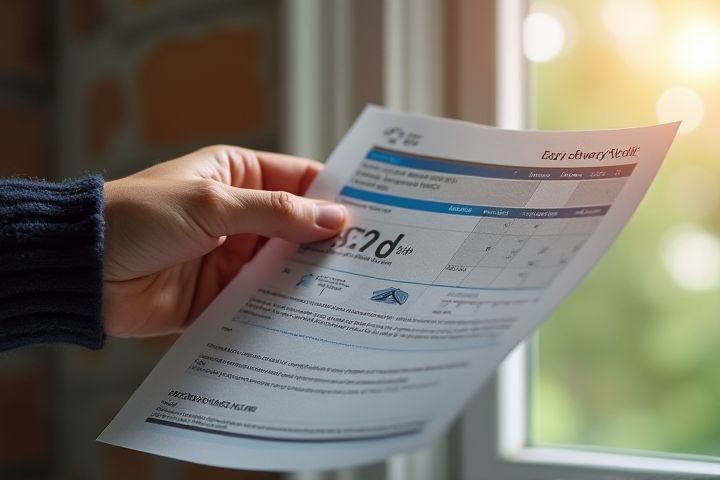
A house energy audit is a comprehensive assessment of your home's energy efficiency, aimed at identifying areas for improvement. During the audit, professionals inspect insulation levels, heating and cooling systems, and appliances to ascertain energy consumption patterns. They utilize advanced tools, such as thermal imaging cameras and blower door tests, to detect air leaks and evaluate overall energy loss. The results from an energy audit provide actionable recommendations for upgrades, like better insulation or energy-efficient windows, that can reduce utility bills and enhance comfort. Completing a house energy audit not only contributes to a more sustainable living environment but also increases your home's value and marketability.
What Is A House Energy Audit
Identifies energy inefficiencies
A house energy audit focuses on identifying energy inefficiencies within your home, which can lead to excessive energy bills and environmental impact. Trained auditors use specialized tools, such as thermal imaging cameras and blower doors, to detect air leaks, inadequate insulation, and inefficient systems. They assess your heating and cooling appliances, windows, and lighting, providing recommendations for improvements that enhance energy efficiency. By addressing these inefficiencies, homeowners can reduce energy consumption, save money, and improve overall comfort.
Analyzes utility bills
A house energy audit is a thorough assessment of your home's energy efficiency, with a significant focus on analyzing utility bills. This analysis helps identify patterns in energy consumption, highlighting peak usage times and revealing potential areas for savings. By comparing current bills against historical data, the audit uncovers unusual spikes in energy usage and suggests cost-effective solutions. You can make informed decisions on upgrades or modifications, ultimately reducing your energy costs and enhancing the overall efficiency of your home.
Assesses insulation quality
A house energy audit evaluates the insulation quality by examining areas such as attics, walls, and basements to identify heat loss and improve energy efficiency. Inspectors utilize thermal imaging cameras to detect temperature discrepancies, revealing insufficient insulation or air leaks. By assessing R-values, the effectiveness of insulation materials, such as fiberglass or spray foam, is analyzed to ensure optimal performance. Enhancing your home's insulation not only reduces energy bills but also contributes to a more comfortable indoor environment.
Examines HVAC performance
A house energy audit focuses on evaluating the performance and efficiency of your HVAC (Heating, Ventilation, and Air Conditioning) systems. During the audit, a professional inspects all components, including ductwork, insulation, and equipment, to identify inefficiencies that may lead to energy waste. By assessing factors like air leaks, temperature inconsistencies, and maintenance needs, the audit provides actionable insights to improve system performance. Enhancing HVAC efficiency not only lowers your energy bills but also increases indoor comfort and air quality.
Inspects lighting and appliances
A house energy audit focuses on evaluating the efficiency and performance of lighting and appliances within your home. Inspectors assess the type of bulbs used, such as LED or incandescent, and measure their energy consumption to identify opportunities for improvement. They also analyze appliances like refrigerators, washers, and dryers, checking for energy ratings and operational efficiency, which can significantly impact your energy bill. By pinpointing areas of high energy use, you can make informed decisions about upgrades or replacements to reduce energy consumption and save money.
Evaluates window and door sealant
A house energy audit evaluates the effectiveness of window and door sealants, which are crucial in preventing air leaks and enhancing energy efficiency. By measuring the thermal integrity of these seals, the audit can identify areas where warm or cool air escapes, leading to potential energy waste. Homeowners may discover that properly sealed windows and doors can reduce heating and cooling costs by up to 30%, as highlighted by the U.S. Department of Energy. This evaluation not only improves comfort but also contributes to a more sustainable living environment, promoting energy conservation practices.
Utilizes blower door tests
A house energy audit focuses on evaluating your home's energy performance, identifying areas of inefficiency, and suggesting improvements. One key component of this audit is the blower door test, which measures the air tightness of your home by creating a slight negative pressure. This test helps detect air leaks around windows, doors, and other openings, allowing for targeted repairs that can enhance energy efficiency. By addressing these leaks, you can reduce your heating and cooling costs, improve indoor air quality, and enhance overall comfort within your living space.
Includes thermal imaging
A house energy audit evaluates your home's energy efficiency, identifying areas where energy loss occurs. This comprehensive assessment often incorporates thermal imaging, which utilizes infrared technology to detect temperature variances within walls, windows, and roofs, revealing insulation gaps and air leaks. As a homeowner, understanding these energy vulnerabilities can lead to effective solutions, such as improving insulation and sealing leaks, ultimately reducing your energy bills and enhancing comfort. By prioritizing energy efficiency, you not only save money but also contribute to a more sustainable environment.
Suggests energy-saving improvements
A house energy audit evaluates your home's energy use, identifying areas for improvement to enhance efficiency. During the audit, a qualified auditor examines insulation, windows, heating, and cooling systems, as well as lighting and appliances. They utilize tools like blower doors and infrared cameras to detect air leaks and thermal inefficiencies. Following the assessment, you receive a detailed report with actionable recommendations, such as upgrading insulation, sealing drafts, or replacing inefficient appliances, aimed at reducing energy consumption and lowering utility bills.
Can reduce energy costs
A house energy audit focuses on identifying areas of energy loss within your home, such as inefficient insulation, outdated appliances, and drafty windows or doors. By implementing the findings of an audit, homeowners can potentially reduce energy costs by 5% to 30%, resulting in savings that can add up to hundreds of dollars annually. Key components of an energy audit include evaluating the heating and cooling systems, assessing lighting efficiency, and examining overall energy consumption patterns. Engaging in this process not only helps in cutting costs but also contributes to a more sustainable environment through reduced energy usage.
